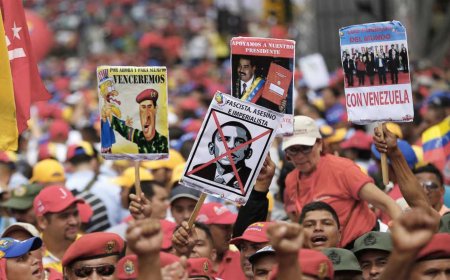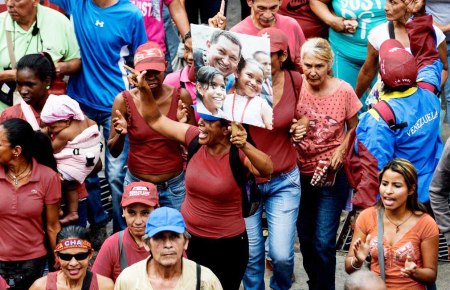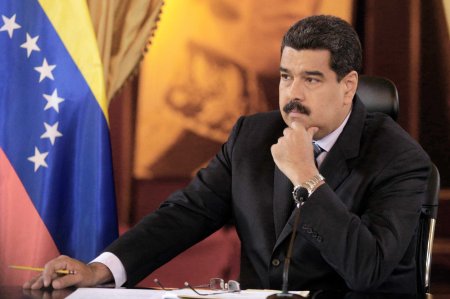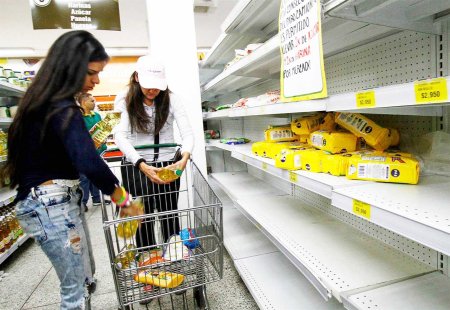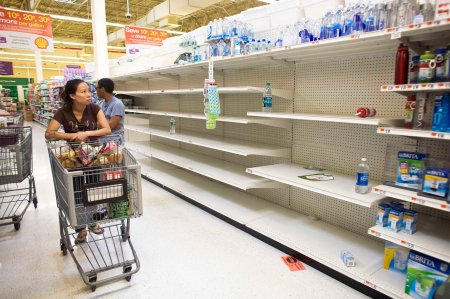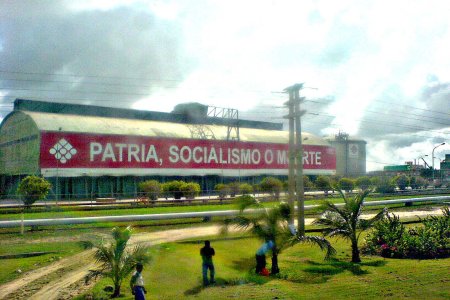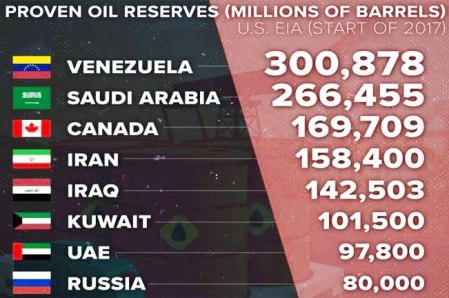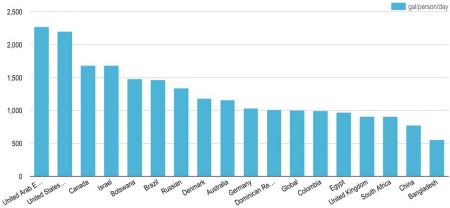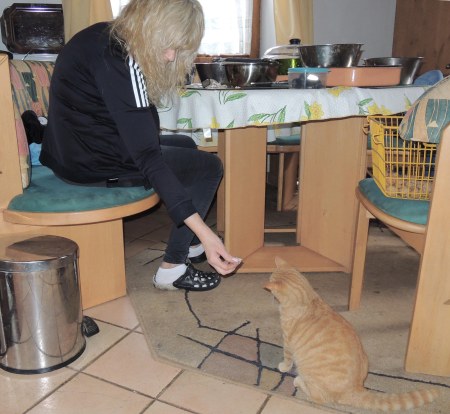Nothing new in the Americas, or, in other words: Some things never change. Except: Regimes change — again and again. From 1898 to 2004, the US government undertook 41 successful regime change interventions in Latin America, an average of one every two-and-a-half years. And that excludes the unsuccessful ones, such as the Bay of Pigs invasion.
Another unsuccessful US intervention was the 2002 coup d’etat against Venezuela’s President Hugo Chavez. Washington immediately recognized the coup, hailing it as a victory for democracy, but privately recognized it as a major win for US business interests in an oil-rich state teeming with potential profit-making opportunities for US corporations.
The newest coup against the Venezuelan government of Nicolas Maduro comes not unexpected, it has been prepared for years with a demonization campaign against the Bolivarian revolution, the PSUV (United Socialist Party of Venezuela), and its leaders, the late Hugo Chavez and his successor Nicolas Maduro.
It has been prepared by a relentless economic war which devastated Venezuelas economy and led to widespread discontent. Discontent which was not severe enough to secure the election of a right-wing president, but big enough to help the MUC (Democratic Unity Roundtable) in 2015 gain a majority in the Parliament of Venezuela.
The Constituent Assembly elections and the regional elections in 2017 though were won by the GPP (Great Patriotic Pole) alliance of the Bolivarian government. Presidential elections in May 2018 saw incumbent Nicolas Maduro being re-elected for a second six-year term.
The regime change operation follows the tried and proven procedures used in Chile, Yugoslavia, Iraq, Libya, Honduras, Ukraine, Zimbabwe, just to name a few examples.
Cuba, Syria, Iran, and Russia have received similar treatments but are still resisting.
The four phases of regime change
1. Defamation, slander, vilification of factions, parties, and leaders in the targeted country, including accusations of corruption, support of terrorism, and atrocities (rape, torture, massacres, genocide). Declaring the targeted government as illegitimate.
2. Economic war including boycott of food, medicine, and other necessities of life, to cause hardship and as a result dissatisfaction in the population.
3. Co-opting or implanting opposition leaders, mainly from the upper class, supporting right wing movements financially, with training, and logistics. Encouraging or ordering opposition leaders to declare themselves the new “legitimate government.”
4. Bribing corruptible politicians and, most important, high ranking military officers with money and the promise of high positions after a regime change. Every man has his price, as the saying goes.
We have undoubtedly reached phase 4 and at the moment there are surely immense efforts undertaken by US agents to find the generals who are willing to sell their souls and depose the elected government in a military coup.
Recent developments
US allies predictably joined the United States to support the attempted coup.
Thirteen of the Lima Group’s members — Argentina, Brazil, Canada, Chile, Colombia, Costa Rica, Guatemala, Guyana, Honduras, Panama, Paraguay, Peru, and Saint Lucia — recognized the move in a joint statement.
The Lima Group is an ad-hoc group of countries formed to facilitate the ouster of Maduro after numerous failed attempts to have the OAS (Organization of American States) formally condemn the Maduro government. In lieu of an official statement OAS President Luis Almagro at last welcomed the attempted coup on Twitter.
The European Union, not as timid as the OAS, issued a statement, that civil rights, freedom, and the safety of Juan Guaido all need to be observed and respected. Until now the EU did not recognize Guaido as president, but EU foreign policy chief Federica Mogherini, called for “free and credible elections.”
French President Emmanuel Macron hailed the “courage” of protesters and tweeted that “Europe supports restoration of democracy” in Venezuela following the “illegitimate election” of Nicolas Maduro.
Stopping short of explicitly recognizing Guaido as Venezuelan president, a spokesman for British Prime Minister Theresa May said: “We fully support the democratically elected National Assembly with Juan Guaido as its president.”
France, Britain, Germany, and Spain warned President Maduro that he must call elections within eight days or they will officially recognize the opposition’s claim of leadership.
Israel and Australia also back the coup.
Cuba’s Foreign Minister Bruno Rodriguez said, that the Venezuelan president would “prevail against the imperialist intervention.”
Bolivia’s President Evo Morales wrote on Twitter: “The claws of imperialism are again trying to deal a death blow to democracy and self-determination.”
Mexico and Uruguay have urged all sides to hold negotiations. Mexico’s president Andres Manuel Lopez Obrador spoke out against foreign intervention in Venezuela: ”We should conduct foreign relations with the principles of nonintervention, of the self-determination of peoples, of peaceful solutions to disputes.”
In Turkey a presidential spokesman wrote on Twitter that Turkey stood by Maduro: “My brother Maduro! Stay strong, we are by your side.”
The Colombian government is not going to provide the United States will military bases so that the latter could launch a possible military invasion in Venezuela, the Colombian Defense Ministry told journalists. The Colombian Defense Ministry also denied, that Colombia is preparing a military intervention into neighboring Venezuela: “The troops will remain at their bases, there has not been and there is not going to be a redeployment of troops.”
US pressure and warmongering
Neoconservative Elliott Abrams was appointed US special envoy for Venezuela.
“Elliott will be a true asset to our mission to help the Venezuelan people fully restore democracy and prosperity to their country,” Mr Pompeo said, according to Reuters.
“It’s very nice to be back. This crisis in Venezuela is deep and difficult and dangerous,” Abrams said Friday. “And I can’t wait to get to work on it.”
Abrams is known as the “Assistant Secretary of Dirty Wars,” a title he earned during his stints with the Reagan and George W. Bush administrations:
In 1993, even after a UN truth commission, which examined 22,000 atrocities that occurred during the twelve-year civil war in El Salvador, attributed 85 percent of the abuses to the Reagan-assisted military and death-squad allies, assistant Secretary of State for Human Rights Abrams said: “The administration’s record on El Salvador is one of fabulous achievement.”
Abrams organized the illegal, covert financing of Contra rebels in Nicaragua behind the back of Congress, which had cut off funding. Abrams lied to Congress twice about his role with the Contras. He pleaded guilty to both counts in 1991 but was pardoned by George HW Bush.
Abrams, a decade later, while working as special Middle East adviser to former president George W Bush, Abrams was an enthusiastic advocate of the disastrous Iraq invasion.
Abrams was in the Bush White House at the time of the failed coup in 2002 against the late Venezuelan President Hugo Chavez.
Abrams helped lead the US effort to stage a coup to overturn the results of the 2006 Palestinian elections, complete with murder and torture.
Members of Congress from both parties are largely united behind President Trump’s recognition of Juan Guaidó as Venezuela’s interim president, and the issue is potent in Florida, a must-win state in 2020.
Sen. Marco Rubio from Florida threatened all out war. Rubio warned the Maduro government in a reference to possible violent clashes at future opposition protests or a move against US diplomats, it was “about to cross a line and trigger a response that believe me you are not prepared to face.”
At first President Maduro ordered the USA to remove all of its diplomats from Venezuela, but Washington ignored the request, claiming Maduro no longer has authority to take such action. While the US Embassy in Caracas was staying open, the State Department ordered non-essential diplomats and embassy staff to leave Venezuela. Maduro ordered all of Venezuela’s diplomatic staff in the United States to return home.
He later agreed to let diplomats remain for 30 days. The Trump administration doesn’t care anyway, because it has accepted Venezuelan opposition figure Carlos Alfredo Vecchio as the country’s diplomatic representative in the USA.
The US embassy in Venezuela just issued a security alert informing of its limited ability to provide emergency services to US-citizens and urging them to “strongly consider departing Venezuela.”
Russia and China criticized the USA for interfering in Venezuelan affairs. Russian President Vladimir Putin said, that “foreign interference in Venezuela’s internal affairs grossly violates international law.” Both Russia and China are major creditors of Venezuela, in fact, they are the only creditors, because Washingtons economic war has deterred any other country to trade with or invest in Venezuela.
An estimated 400 Russian military contractors from the Wagner Group have been sent to Venezuela to provide security for Maduro. Some arrived already last year but another group came more recently.
Defamation and demonization
Western critics denigrated Hugo Chavez for 14 years. He was called a strongman, an autocrat, a dictator. Secretary of Defense Donald Rumsfeld once compared him to Hitler.
Former Bush administration Deputy Secretary of State/Director of National Intelligence John Negroponte alleged, that: “Chavez uses his control of the legislature and other institutions to continue to stifle the opposition, reduce press freedom, and entrench himself through measures that are technically legal, but which nonetheless constrict democracy.”
When Chavez died from cancer (a fact which raises certain suspicions), Nicolas Maduro replaced him, only to face the same allegations, the same defamation campaign by US officials and the united Western press.
US Secretary of State Mike Pompeo: “The time for debate is done. The regime of former President Nicolás Maduro is illegitimate. His regime is morally bankrupt. It’s economically incompetent. And it is profoundly corrupt. It is undemocratic to the core. I repeat: The regime of former President Nicolás Maduro is illegitimate. We therefore consider all of its declarations and actions illegitimate and invalid.”
Pompeo called on countries to “pick a side” on Venezuela, urging them to back opposition leader Juan Guaido in a speech at the UN Security Council in New York: “Now, it is time for every other nation to pick a side. No more delays, no more games. Either you stand with the forces of freedom, or you’re in league with Maduro and his mayhem.”
In Western media President Nicolas Maduro is simply called “Maduro”, with attributes attached to him such as “dictator,” “despot,” or “autocrat.” He is a former bus driver, which is often mentioned to make the point, that he is uneducated, incompetent, and brutal. No-one has compared him yet with Stalin.
Michael Reid writes in the Guardian: “Corrupt Maduro has broken his country. Now, democracy must have its day. He is clinging to power. Only removing him will pull Venezuela back from the brink.” And: “Maduro leads a corrupt authoritarian regime that has stolen and broken a once-prosperous country, staging a coup against its own constitution.” And: “In Caracas, the military offers Maduro the loyalty of a partner in crime. The generals fear that Guaidó’s offer of an amnesty for the billions they have stolen will not be honored. Maduro will no doubt try to limp on through further repression, but he may run out of money.”
Economic war against Venezuela
Economic sanctions prohibit US financial institutions from processing any transaction and having any interaction with the Venezuelan government and PDVSA (Petroleos de Venezuela), the Venezuelan state-owned oil company.
Steven Mnuchin, the secretary of the treasury, undertook various investigations and workshops with representatives of Japan, Europe, and Latin America in order to find out where Venezuelan shell companies are. US threats have discouraged commercial and financial interests throughout the world from any kind of transaction with Venezuela.
Citgo, the huge American-based subsidiary of PDVSA, has not been allowed to transfer back to Venezuela any money that it’s making in the USA. It means that the Venezuelan government is being deprived of approximately 1 billion US$ a year.
This is plain and simply theft, it is criminal. It is against international law and against WTO rules. This should be a warning for anybody who has to deal with the US-American regime.
A few details:
In July 2016 US Citibank unilaterally ceased the account service in foreign currency of Venezuelan institutions in the USA, including the accounts of the BVC (Central Bank of Venezuela).
In August 2016 the closing of US accounts decreased Venezuela’s capacity to carry out US$ transactions and forced the Republic to migrate transfer operations and manage funds into other currencies, imposing to the country high transaction and operating costs. Novo Banco in Portugal notified Venezuela about the impossibility to carry out transactions in US$ with Venezuelan banks and institutions, because of pressures exercised by US authorities.
In February 2017 the US Treasury Department included the then Executive Vice-President and now Minister of Industries, Tareck El Aissami, on a list of sanctioned persons for “drug trafficking.” The OFAC document neither presented evidence of the accusation nor was an inquiry ever opened in a court.
In July 2017 the Delaware company-payment agent of the PDVSA informed that its correspondent bank (PNC Bank) in the US refused to receive more funds from the Venezuelan oil company. The US Department of the Treasury imposed sanctions against a group of Venezuelan officials, including President Nicolas Maduro. Citibank refused to receive Venezuelan funds for the import of 300 thousand doses of insulin, destined to cover the demand of 450 thousand registered patients.
In August 2017 the Bank of China Panama branch informed that due to instructions from the US Treasury Department and pressure from the Panamanian government, it was not able to carry out any operation in foreign currency in favor of Venezuela. Banks in Russia reported the impossibility of making transactions to Venezuelan banks due to the restriction that US and European banks were imposing.
The same month Donald Trump issued Executive Order 13808 that prohibits transactions with PDVSA and any other entity owned or controlled by the Venezuelan government. The PDVSA is prohibited from acquiring new debts. The Venezuelan government is prohibited from acquiring new debts and obtain new stock shares. The payment of dividends or the distribution of profits to the government of Venezuela by entities in the US is prohibited (this particularly affects Citgo).
Also in August Euroclear — a company in charge of holding an important part of Venezuela’s sovereign bonds — froze bond transaction operations on the pretext of “revision.” Euroclear now withholds more than 1.2 billion US$, seriously affecting the Republic’s financial liquidity.
In October 2017 Deutsche Bank informed China’s CITIC BANK about the closure of accounts for having executed PDVSA payments. The US blockade prevented Venezuela from transferring money for vaccines and medicines to UBS Swiss bank, causing a delay of four months in the acquisition of vaccines and altering vaccination schedules in the country.
In November 2017 the transnational pharmaceutical companies Baxter, Abbott, and Pfizer refused to issue exportation certificates to cancer drugs, making it impossible for Venezuela to buy them. Deutsche Bank — which is the main correspondent bank of the BVC (Central Bank of Venezuela) permanently closed all accounts of the BVC, putting at risk the Republic operations flow.
The Bank Of England still refuses to hand over 31 tons of Venezuelan gold reserves worth 1.2 billion US$. Officials in Caracas have for weeks tried to withdraw the gold, with Calixto Ortega, the head of Venezuela’s central bank, traveling to London in mid-December to seek access to the nation’s assets.
Sanctions and theft of asserts have collapsed the Venezuelan currency and cut the country from their most important markets. But this is not all, Washington is threatening Caracas with further sanctions, even with an oil embargo.
US-led campaigns of economic warfare do make people’s lives miserable, and many people will attribute their misery to corruption and incompetence of the government, while others may recognize that sanctions are the cause of their misery, but nevertheless will support regime change to win relief from foreign-imposed misery.
It does’t always work this way, as Cuba, Syria, Iran, and Russia show.
For Venezuela, the only way to survive is to immediately cut off all dependency on the West. There is still trade with Cuba, Uruguay, Bolivia, China, Russia, Iran, and many Asian countries. Cuba has endured and withstood an embargo for 60 years, Venezuela should be able to do the same.
Unfortunately Nicolas Maduro has not the charisma of Fidel Castro Ruiz, but maybe he grows with the challenge.
Co-opting and funding opposition
The Venezuelan government was always ready for negotiations and compromise. There were nearly 150 meetings between opposition and PSUV between May 2016 and January 2018 in the Dominican Republic, which ended with an agreement to hold early presidential elections, but Rex Tillerson, then US Secretary of State, made a telephone call to Julio Borges (ex-President of the National Assembly), telling the opposition not to sign the agreement, because the USA was certain that the opposition would lose. This was the real reason why the right wing parties did not take part in the Presidential elections in May 2018, which Nicolas Maduro won.
While speaking at the OAS, US Secretary of State Mike Pompeo pledged to send 20 million US$ to the Venezuelan opposition in the form of humanitarian aid to address the shortages of food and medicine, caused by Western sanctions. 20 million US$ is less than a pittance compared to the tens of billions of dollars that US sanctions have sucked out of the Venezuelan economy, but it will allow the opposition parties to had out gifts to the population and gain sympathy.
At a mass rally in Caracas opposition leader Juan Guaido, a 35-year-old US-educated engineer, took a public oath of office and swore himself in as interim president. A Wall Street Journal report confirmed suspicions that opposition leader Juan Guaido’s move to declare himself “interim president” was highly coordinated with the Trump White House and Republican lawmakers.
It is a risky strategy. Leopoldo Lopez, another US-anointed opposition leader, led protests that became violent and saw protesters causing damage meant to cripple Venezuelan infrastructure. The uprising ultimately failed, and Lopez is now under house arrest.
Juan Guaido is the former leader of the National Assembly, “former,” because Venezuela’s Supreme Court has disavowed him. In addition to that move, the Supreme Court has declared all acts of the country’s National Assembly null and void.
Bribing politicians and generals
The declaration of an interim president followed several days of rallies in Caracas. The protests inevitably turned violent with at least 18 dead, giving the opposition the opportunity to call for the military to rise up against the government.
But Defense Minister Padrino Lopez rejected Guaido’s self-proclamation as president: “I alert the people of Venezuela that a coup is being carried out against our institutions, against our democracy, against our constitution, against our President Nicolás Maduro — the legitimate president of Bolivarian Republic of Venezuela.”
Until now there are no reports of any rebellions within the armed forces and high-ranking members of the Venezuelan military reiterated their loyalty to Nicolas Maduro. One by one, eight regional commanders and Defense Minister Padrino Lopez appeared on state television pledging their loyalty and denouncing the coup. Minister Lopez also said, that Venezuela’s security forces would never accept an “imposed” government.
At Caracas’ main military base Padrino Lopez, flanked by his top lieutenants, told reporters: “We swore to die for the fatherland,” and: “What we saw yesterday was reprehensible.”
Thousands of messages calling for rebellion are sent to soldiers every day over WhatsApp and other social media platforms from neighboring Colombia.
Some two dozen national guardsman revolted at a base in west Caracas, stealing weapons and posting videos on social medial that called on other soldiers to defect. The revolt was instantly squashed as were a few other desperate attempts before. During a similar revolt in 2017 20 soldiers and armed civilians attacked the base Fort of Paramacay, calling for a traditional government. This attack was also quickly subdued.
Venezuela’s military representative to the USA Jose Luis Silva defected and urged his “brothers in the armed forces of the nation to recognize Juan Guaido as the legitimate president.” Venezuelas defense ministry said Col Silva was guilty of treason.
Juan Guaido told The Washington Post that the opposition party was in “behind the scenes” talks with military and civilian officials to force out Maduro.
Securing strategic resources
The need to secure control about resource exploitation makes US regime change efforts in Venezuela more urgent. Taking Venezuelan oil from the market would have a positive impact on US shale production (though shale oil probably never will be able to generate profits), and recent Venezuelan contracts with Russia and Turkey about oil and gold directly threaten US business interests.
The proven oil reserves in Venezuela are the largest in the world, totaling 297 billion barrels. In December, Caracas and Moscow signed a 5 billion US$ investment deal to raise Venezuela’s oil production by one million barrels per day. This move was done to counter the effects of US sanctions which have been crippling the country, it certainly raised many neocon eyebrows and fueled already high anti-Russian sentiment. Altogether Russia has funneled some 6 billion US$ to PDVSA in return for oil and petroleum assets.
Over the past decade, China has extended more than 50 billion US$ to Venezuela through oil-for-loan deals, and in July 2018 it announced another 250 million US$ from the China Development Bank to boost the country’s oil production.
Aside from the proven oil deposits, Venezuela is also known for its extremely rich gold deposits. Also in December, Caracas gave the green light to Russia to begin mining gold inside their country.
According to the Russian ambassador: “As for Russia’s participation in gold-mining or other mining projects, Venezuela has made a wide range of interesting proposals that are currently under consideration by interested Russian operators.”
Because of its rich deposits and the need to bypass US sanctions with alternative payment methods, Venezuela has become the 25th largest holder of gold in the world, making the country a direct threat to the global banking system and the status of the US dollar as reserve currency (pedrodollar).
Turkish President Recep Tayyip Erdogan recently launched a gold trade operation with Nicolas Maduro. But this was not simply shipping gold from one place to another. Maduro announced that he was moving Venezuelas entire refining operation to Turkey in order to avoid Western monetary controlled sanctions.
US-backed self declared “interim president” Juan Guaido immediately targeted PDVSA, the state-owned oil company, which he is hoping to restructure and move toward privatization. He also attempted to fire the directors of Citgo Petroleum, Venezuela’s most important foreign asset and the largest purchaser of Venezuelan oil, although US sanctions, as already mentioned, have now for years prevented the company from sending revenue back to Venezuela, starving the government of funds.
Juan Guaido reportedly has drafted plans to introduce a new national hydrocarbons law that establishes flexible fiscal and contractual terms for projects adapted to oil prices and the oil investment cycle. This plan would involve the creation of a new “hydrocarbons agency” that would offer bidding rounds for projects in natural gas and conventional, heavy and extra-heavy crude.
In other words, these moves would privatize Venezuela’s oil and wide open the door for US corporations.
Other public companies would be equally subject to a restructuring process in order to “ensures their efficient and transparent management, including through public-private agreements.”
If the current coup attempt does not succeed, the Trump administration intends to use the newly declared interim government as a tool to deny the Maduro government any oil revenue from the USA and allied nations.
Juan Guaido also instantly requested IMF (International Monetary Fund) money and announced, that he will send a new representative to the Inter-American Development Bank.
The IMF is nothing else than a vehicle for US political and economic influence. For decades, the IMF, along with the World Bank, trapped ostensibly independent Latin American nations (like Argentina) in debt and imposed so-called “structural adjustment” programs that forced governments to impose neoliberal shock therapies on their populations, including austerity measures, privatization of state assets, deregulation, tax exemptions, and gutting of social services.
Venezuela’s opposition always made it clear that it plans to pursue aggressive neoliberal reforms. The opposition-controlled National Assembly declared in its “transition” plans that the “centralized model of controls of the economy will be replaced by a model of freedom and market based on the right of each Venezuelan to work under the guarantees of property rights and freedom of enterprise.”
This plan is a dream for foreign corporations and the global rentier class.
